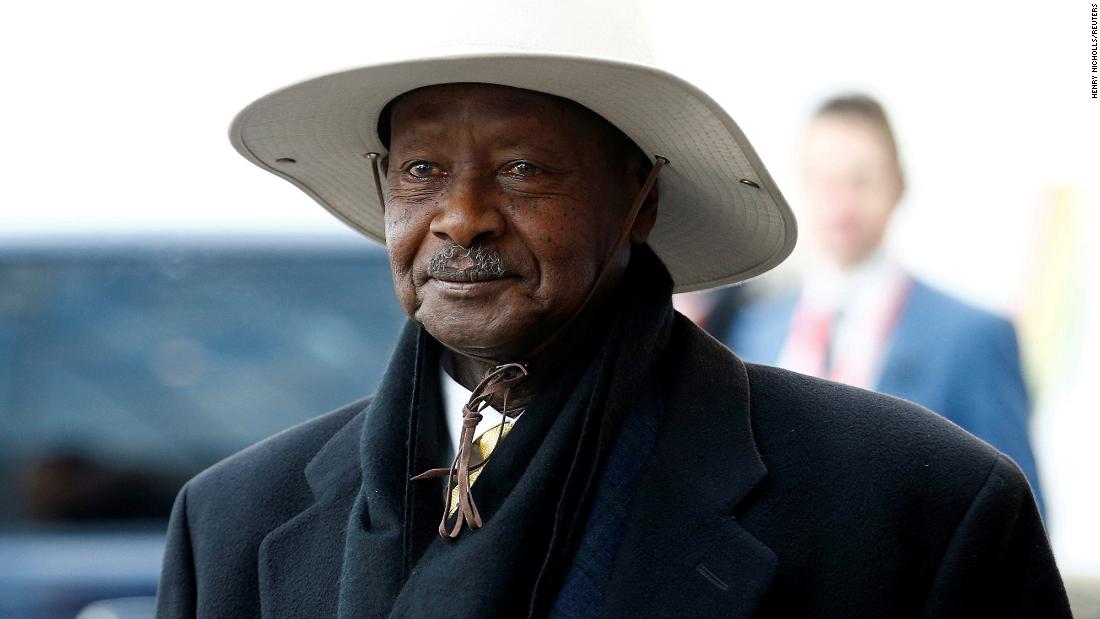Bobi Wine – a singer turned political, whose real name is Robert Kyagulanyi – came in second place in the vote, according to the country’s electoral commission.
Wine said his team was considering all peaceful, non-violent and legal options for contesting the results, as fears of post-election unrest emerge after deadly violence in the months leading up to the vote.
“We are the real winners of this election and, therefore, what the election commission announced has nothing to do with the real election that took place,” Wine told CNN immediately after the announcement.
“I can ask all Ugandans to reject the announcement made by the electoral commission … to reject them with the contempt they deserve.”
The election commission said Museveni won overwhelmingly, with 58.64% of the nearly 10 million votes, while the Wine opposition received 34.83% of the vote.
Wine said he had evidence of fraud and intimidation, but did not provide details about the alleged evidence, saying his team would share it when the lines of communication were restored. He had previously accused the electoral commission of electoral fraud.
The internet in Uganda was closed for days by order of the government. Wine said he was struggling to contact his leadership team after being placed under house arrest on Friday.
Museveni, 76, has been in power for more than three decades, and before that vote, outside observers believed there was little chance of him stepping down.
Saturday’s results follow months of campaigning that have been marked by severe state security responses to anti-Museveni protests, as well as the arrests of members of civil society.
Dozens of people were killed in the months leading up to the vote, including 45 who died in protests in November alone, after Wine was arrested for allegedly violating Covid-19 restrictions.
“It is clear that the violence does not come from the people of Uganda, the violence comes from the police and the military,” said Wine, when asked if he feared that his call to reject the results would lead to violence.
Ugandans voted in the poll on Thursday, amid the shutdown of the Internet. In a speech on Tuesday, Museveni confirmed that his government had ordered ISPs to block Facebook and other social media, accusing the platforms of “arrogance”. On the morning of election day, the order was extended.
Wine made a big campaign on social networks, since some traditional media refused to include him in the electoral coverage.
The Internet blackout raised questions about the integrity of vote counting and also meant that biometric machines failed to register ballots, forcing many polling stations to use voting and manual checks.
There have been reports of late delivery of election material and insufficient material at various polling places. Journalists traveling to Wine’s residence for a press conference were refused by security forces before arriving at his home. Many were also forced to leave the counting center for national elections, despite having accreditation.
Disabled monitors
Before voting on Thursday, Wine addressed the media and complained that the majority of his voters across the country were prevented from attending the elections by the police. Uganda’s law ensures that all candidates are represented at polling stations.
He reiterated his calls for the United States and the European Union to hold Museveni and his government responsible for free and fair elections, accusing the leader of forcing the country to “hold elections in the dark” with its internet blackout.
“Excessive use of force by law enforcement and security agencies has seriously damaged this electoral process,” added Borrell.
Museveni told CNN on Tuesday that he would “accept the results” if he lost.
“If I lose a fair election, I will accept the results, of course, because Uganda is not my home,” he told CNN’s Christiane Amanpour.
“If the people of Uganda do not want me to help them with their problems, I will go and deal with my personal problems with great joy”,
Wine ‘under siege’
On Friday, Wine told CNN that his life is in danger, as his home was taken “under siege” by the military.
Wine said his phone was blocked and his internet connection cut off for some time when security forces broke into his home the day after the polls opened.
Appearing on NTV, Kampala police spokesman Luke Owoyesigire said that Wine was not in prison.
“We just provided security in the area, nothing much,” he said.
Owoyesigire said state security was responding in an effort to secure Wine’s residence and protect the candidate after two individuals were seen trying to gain access to the house by jumping over the fence, adding that one of the individuals was arrested.
But a CNN reporter near Wine’s residence on Saturday said there was still a large military presence around the complex, as well as military helicopters and drones circling overhead.
Wine’s lawyer, David Lewis Rubongoya, told CNN that Wine was still under house arrest.
“The military is not allowing people to enter. They are just reading the results they want. This election has been manipulated in such a blatant way,” he said.
“It is a sign of intimidation by the regime, but they too are very afraid of the people. They lost that election in a very bad way. Bobi Wine is such a unifying factor, so they fear the people will get up, so that’s why they are keeping him under a kind of house arrest. It is illegal and unconstitutional ”.
He added that Wine’s team is looking for all legal options to contest the results, once all of them are released.
